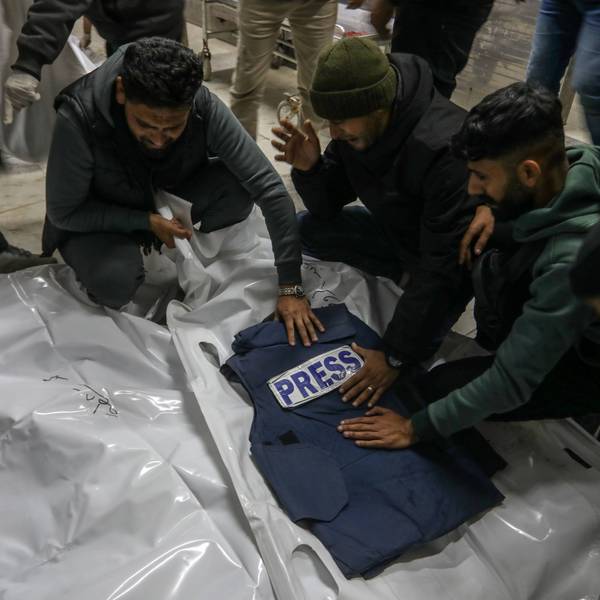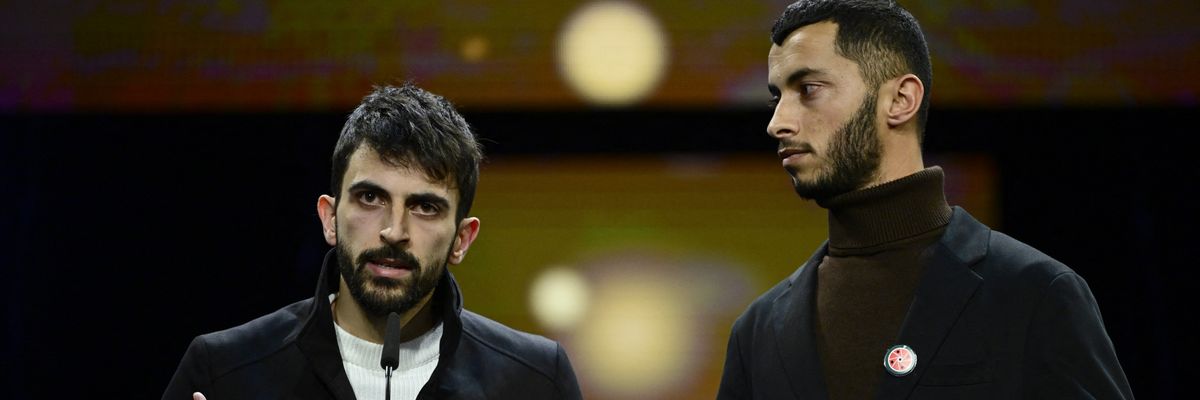Despite facing death threats, Israeli documentary filmmaker Yuval Abraham said Monday that he stood "behind every word" of his condemnation of Israeli apartheid and the bombardment of Gaza, which he expressed while accepting the award for Best Documentary at the Berlin International Film Festival, also known as Berlinale.
Abraham stood alongside his co-director, Palestinian lawyer and activist Basel Adra, on Sunday as they accepted the award for their film No Other Land, about the Israel Defense Forces' (IDF) demolition of homes in the occupied West Bank and eviction of people living there.
"I am free to move where I want in this land, Basel is, like millions of Palestinians, locked in the occupied West Bank," said Abraham. "This situation of apartheid between us, this inequality, it has to end."
Adra followed Abraham's remarks by calling on Germany to "respect the [United Nations] calls and stop sending weapons to Israel," garnering applause from the audience, as he noted that the support of Western countries has allowed at least 29,782 Palestinians in Gaza to be "slaughtered and massacred" by Israel.
The Israeli public broadcaster, Kan, promptly labeled Abraham's remarks an "antisemitic speech," while Berlin Mayor Kai Wegner denounced the statement and those of several other Palestinian rights supporters at the awards ceremony.
Abraham's statement, filmmaker Ben Russell's decision to wear a traditional Palestinian keffiyeh, and filmmaker Eliza Hittman's call for a cease-fire—a demand supported by international human rights groups, the vast majority of member states at the U.N. General Assembly, and numerous U.N. agencies—were reduced to "an intolerable relativization," according to Wegner.
The city's culture minister said the awards ceremony was "characterized by self-righteous anti-Israeli propaganda," while the federal commissioner for culture and the media said Monday that the government will open an investigation into the filmmakers' statements.
The outrage over the calls for an end to Israel's bombardment and oppression of Palestinians amounted to "authoritarian insanity," said journalist Mehdi Hasan.
Mickey Gitzin, director of the Israeli social justice group New Israel Fund, posited that the reaction to Abraham's comments in the country's news media "indicates more than anything else the great embarrassment of most Israelis about the reality of life we are creating in the West Bank."
"It is impossible to be a person with conscience and morals, to look at reality and live with it in peace," said Gitzin. "Therefore, most of us simply prefer to close our eyes, and those who are really careful, seek to kill the messenger."
After the film festival, Berlinale's official Instagram page was hacked by activists who posted messages including: "Genocide is genocide. We are all complicit."
In a statement about the Instagram incident, which the Berlinale said shared "antisemitic" rhetoric, the festival also distanced itself from the award winners who spoke out in favor of a cease-fire and criticized Israel's assault on Gaza and suggested that they should have also made supportive comments about Israel.
"We understand the outrage that the statements made by some of the award winners were perceived as too one-sided and, in some cases, inappropriate," said executive director Mariëtte Rissenbeek. "From our point of view, it would have been appropriate in terms of content if the award winners and guests at the award ceremony had also made more differentiated statements on this issue."
Film critic Siddhant Adlakha denounced the festival's response as "incredibly cowardly."
Germany's threat to investigate Abraham "for simply acknowledging the apartheid under which his Palestinian co-director lives, is both chilling and completely absurd," said Adlakha. "Just one of the many ongoing acts of institutional cowardice the film world sorely needs to recognize."




